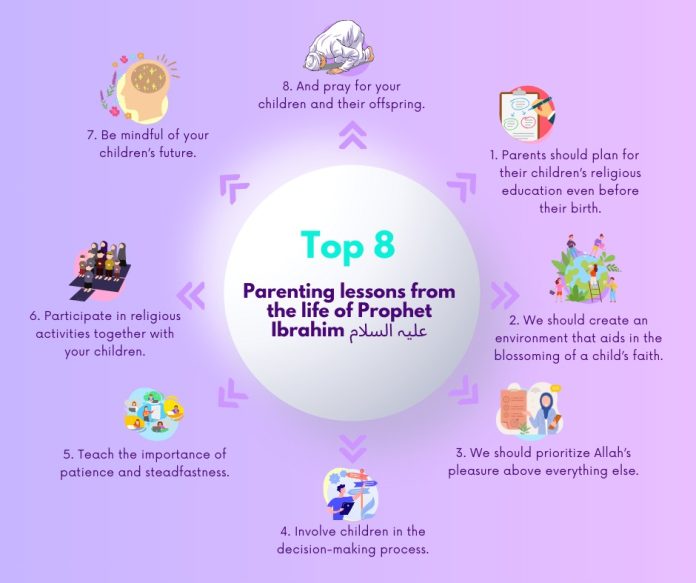– Arif Irfan
The life of Prophet Ibrahim provides a profound blueprint for fatherhood, demonstrating how devotion to Allah can coexist with a deep love for one’s family. His story offers valuable insights into the delicate balance between religious commitment and parental responsibilities.
The Importance of Planning
Prophet Ibrahim had planned even before his children were born to educate them in the ways of faith. This shows the importance of planning and preparing for parenthood, even before the arrival of a child.
Practical Tip: We can apply this lesson by preparing ourselves for parenthood and planning for our children’s spiritual education. This could involve learning about parenting from an Islamic perspective, making du’a for our future children, and setting goals for their religious upbringing.
- Setting Up a Conducive Environment for Faith
Prophet Ibrahim’s life was characterized by his commitment to creating a conducive environment for the spiritual growth of his children. He chose the holy city of Makkah as the place to raise his family, despite its arid and barren conditions, because he believed that it would support the continuity of their spiritual growth.
Practical Tip: As parents, we can strive to create a conducive environment for our children’s spiritual growth. This could involve choosing to live in a community that supports our religious values, or creating a home environment that encourages spiritual development. Regular prayers for our children’s future can profoundly influence their lives and the atmosphere in which they are raised.
- Devotion to Allah Above All Else
Prophet Ibrahim’s life was characterized by an unwavering devotion to Allah. This devotion was so profound that it even surpassed his love for his family. When Allah commanded him to leave his wife Hajar and son Ismail in the barren deserts of Makkah, he did so without hesitation. His complete trust in Allah’s plan took precedence over his paternal instincts. This act of obedience was a powerful demonstration to his children that, no matter what happens, Allah comes first.
Practical Tip: As parents, we can instill this principle in our children by prioritizing our religious obligations and demonstrating our commitment to Allah in our daily lives. We can show them that while we love them deeply, our ultimate loyalty is to Allah.
- Engaging Children in Decision-Making
Despite his unwavering intention to obey Allah’s command to sacrifice his son, Prophet Ibrahim engaged his son in the decision-making process. He asked his son for his opinion on the matter, not because it would change his course of action, but to use it as a teaching moment. This act of involving his son in such a momentous decision demonstrates the importance of engaging children in decision-making processes.
Practical Tip: We can apply this lesson in our parenting by involving our children in family decisions. This can help them feel valued and respected, and it can also serve as a teaching moment to guide them if they make a wrong decision.
- Cultivating Patience and Steadfastness
When faced with the prospect of being sacrificed, Prophet Ibrahim’s son responded with unwavering faith, saying, “Father, do as you are commanded and, God willing, you will find me steadfast.” This response reflects the values of patience and steadfastness that Prophet Ibrahim had instilled in his son.
Practical Tip: As parents, we can strive to cultivate these values in our children. We can teach them the importance of patience and steadfastness in the face of trials and challenges, and we can model these values in our own behavior.
- Building Foundations Together
One of the most memorable aspects of Prophet Ibrahim’s life is his construction of the Ka’bah. However, it is often overlooked that he built it with his son, Ismail. This was not a solitary act of devotion, but a team effort, a shared experience that strengthened their bond and deepened their shared commitment to Allah.
Practical Tip: As parents, we can involve our children in our religious activities. Whether it’s praying salah together at home, breaking iftar together during Ramadan, attending halaqahs at the masjid, or driving to the masjid together for ‘Isha, these shared experiences can help cultivate a future generation that remains upon the Deen.
- A Father’s Concern for His Progeny
When Allah bestowed upon Prophet Ibrahim the high honor of being an imam, a leader for the people, his immediate response was a question about his descendants. This response highlights a key aspect of his character – his concern for his progeny. Even in the midst of receiving such a high honor, his thoughts were with his children and their future.
Practical Tip: As parents, we should always be concerned about our children’s future. We should guide them in their choices and pray for their success, just as Prophet Ibrahim did.
- Du’a for Children and Descendants
Prophet Ibrahim made du’a for his children and their descendants. He prayed that they would be Muslims in submission to Allah, and that from his descendants would come a prophet to guide them to the truth.
Practical Tip: We can make similar du’as for our children, praying for their guidance, their faith, and their success in this life and the hereafter.
These lessons from the life of Prophet Ibrahim can serve as a guiding light for parents, helping them raise their children in a manner that is pleasing to Allah
[Arif Irfan, CMA (US), is Asst. Director, Department of Education, JIH Telangana, Hyderabad]




